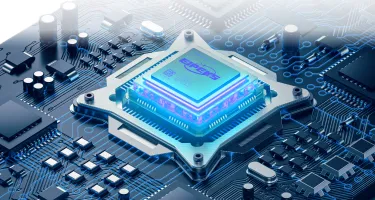
Home > FPGA Design Services
Home > FPGA Design Services
FPGA Design Services
EIPEKS provides comprehensive, high-quality FPGA solutions to customers around the world. Our services cover the entire process, including FPGA hardware design, logic software development, IP core configuration, data processing algorithm implementation, etc.
Whether you need high-performance computing, real-time data processing, or customized logic functions, our experts can provide professional support to ensure that your project meets the highest standards, and help you tackle FPGA design challenges of any size or complexity.
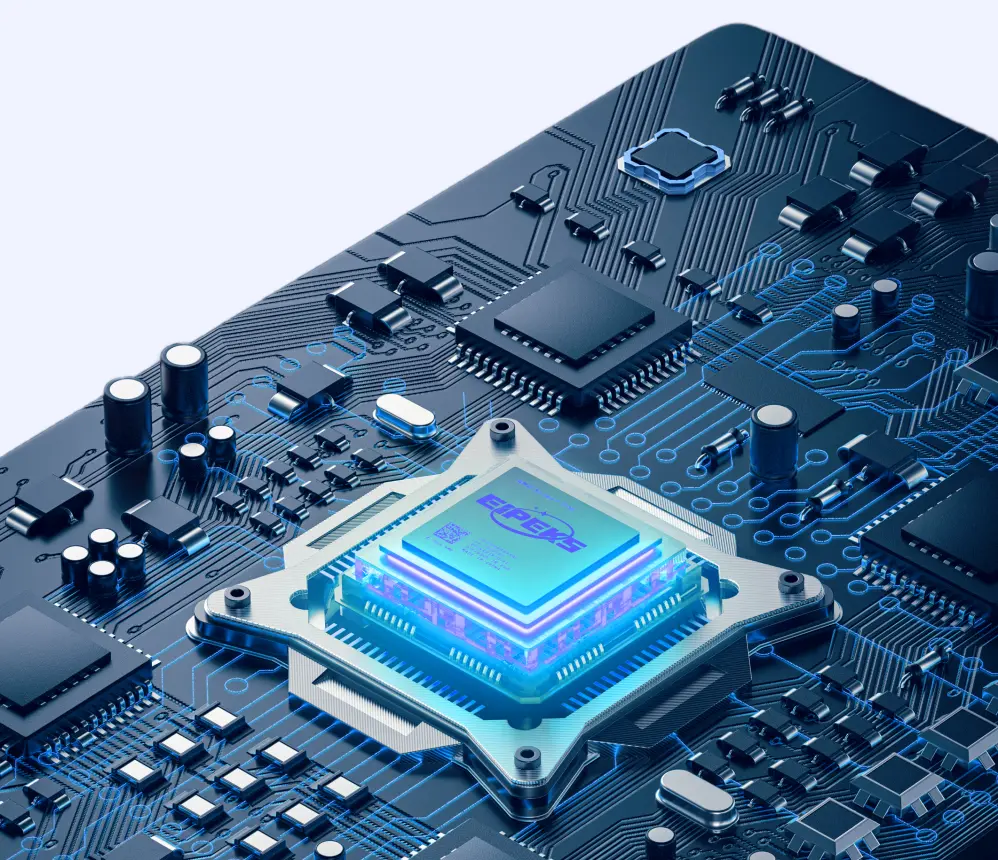
Our FPGA Development Services

Integrating Synthesizable IP Cores
We integrate synthesizable IP cores into your design to ensure flexibility and full functionality.

RTL Design Modeling (Verilog, VHDL)
We use Verilog and VHDL for detailed Register Transfer Level (RTL) modeling to ensure accuracy and efficiency.

Technical Feasibility Analysis
We conduct thorough technical feasibility analyses to assess the technical and commercial potential of your project, providing data for future design.

Microarchitecture Planning
We plan the microarchitecture based on your needs, including functional module design and interface configuration to optimize performance and resource management.

Design Synthesis and Optimization
We perform design synthesis and optimization to improve resource utilization and performance to meet specific application needs.

High-Speed Timing Optimization
We address timing issues of high-speed signals to ensure stability and signal integrity under high-frequency operation, thereby optimizing timing performance.

All-Tech Platform FPGA IP Development
We offer IP development services for various FPGA platforms, including customized function modules and interface design.

Cutting-Edge Technology Concept Testing
We test new technologies to check their feasibility and support the exploration of innovative applications.

FPGA Prototype for ASIC Design Verification
We develop FPGA prototypes for ASIC design verification. We support functional testing and performance evaluation to ensure the accuracy of ASIC design.

FPGA Debugging and Co-Verification
We offer debugging and co-verification services to ensure the functional correctness and system compatibility of the design during integration.

Post-Synthesis Functional Simulation
We perform functional simulation testing after synthesis to verify that the design meets the expected requirements.

System-Level Verification
We conduct system-level verification, including comprehensive functional testing, performance evaluation, and stability checks, to ensure the overall reliability of the system.

Customized Logic Function Module
We develop logic modules with specific functions, including arithmetic operation units, data processing units, and control logic, etc., and highly customize them according to customer needs.

Communication Protocol Implementation
We design and implement FPGA logic for various communication protocols like SPI, I2C, UART, Ethernet, etc., to support data transmission and interface communication.

Signal Processing Algorithm
We implement advanced signal processing algorithms, including filter, Fourier transform, and DSP algorithm, to enhance signal analysis and processing capabilities.

Image Processing Algorithm
We develop image processing function modules, such as image filtering, edge detection, image enhancement, etc., for real-time image processing and analysis.

Data Encryption and Security
We develop function modules for data encryption and security, including encryption algorithm, hash function, authentication mechanism, etc., to ensure data safety.

Interface Driver
We design and implement drivers for various external interfaces such as storage interface, display interface, sensor interface, etc., to enable device interactions.

High-Performance Computing Module
We develop high-performance computing modules like matrix operation, parallel processing units meet the needs of compute-intensive applications.

Real-Time Control System
We implement logic for real-time control systems, such as PID controller, state machine, timing control, etc., for industrial control and automation applications.

Data Acquisition and Processing
We design data acquisition and processing systems, including sampling, buffering, data conversion, etc., for real-time data monitoring and processing.

FPGA Embedded System
We develop system solutions embedded in FPGA, such as embedded processors, hardware accelerators, etc., to provide specific functions and performance requirements.

Digital Circuit Design
- Logic Gate Circuit Design: We design basic logic gates like AND, OR, and NOT gates.
- Counter and Register: We develop various counters (e.g., synchronous counter, asynchronous counter) and registers (e.g., shift register, latch).
- State Machine Design: We create finite state machines (FSMs) for the implementation of control logic.
- Digital Signal Processing (DSP): We design digital filters and transformation algorithms for signal processing.

Analog Circuit Design
- Amplifier Design: We design different types of amplifiers, such as operational amplifier, differential amplifier, and power amplifier, etc.
- Filter Design: We develop analog filters, including low-pass, high-pass, band-pass, and band-stop filters.
- Voltage Reference and Power Management: We design stable voltage reference sources and efficient power management circuits.
- Signal Conditioning: We implement signal conditioning circuits, including signal amplification, filtering, conversion, etc., to meet the requirements of subsequent processing.

Circuit Optimization and Adjustment
- Power Consumption Optimization: We analyze and optimize circuit power consumption to improve energy efficiency.
- Noise Suppression: We perform noise suppression and signal integrity analysis to reduce interference.
- Thermal Management: We design thermal management solutions to ensure that the temperature of the circuit is stable during operation.

Prototyping and Testing
- Hardware Prototyping: We develop circuit prototypes based on the design and conduct actual testing and verification.
- Circuit Testing and Verification: We conduct comprehensive circuit testing, including functional testing, performance evaluation, and troubleshooting.

Customized Circuit Solution
- Application-Specific Circuit Design: We develop application-specific circuit solution based on customer needs, such as automotive electronics, medical device, and communication system.
- System-Level Integration: We integrate customized circuits into the overall system to ensure compatibility and performance.

High-Speed Data Path Design
High-Speed Serial and Parallel Data Paths: We design data paths that support high-speed data transmission, such as PCIe, USB 3.x, LVDS, etc., to optimize the data flow path to increase bandwidth and transmission rate.

High-Bandwidth Data Flow Control
Flow Control and Buffer Management: We implement efficient data flow control and buffering mechanisms to optimize data transmission and processing in the system.

Signal Integrity Optimization
High-Speed Signal Integrity: We analyze and optimize the integrity of high-speed signals to reduce noise, crosstalk, and signal distortion, ensuring the accuracy and stability of data transmission.

High-Frequency Timing Management
Clock and Timing Optimization: We optimize clock distribution and timing management to ensure timing accuracy and clock synchronization in the system, especially under high-frequency operations.

High-Performance Data Processing Algorithm
Parallel Processing and Acceleration: We develop parallel data processing algorithms and hardware acceleration solutions to enhance data processing speed and efficiency.

High-Frequency Signal Conditioning
Signal Amplification and Filtering: We design high-frequency signal conditioning circuits, such as amplifiers and filters, to ensure signal quality and processing capabilities.

Real-Time Data Processing System
Real-Time Processing Design: We create efficient real-time data processing systems to meet the instant processing requirements of high-speed data streams.

Hardware Acceleration Design
Customized Accelerator: We develop customized hardware accelerators for high-speed data processing in specific applications, such as image processing and machine learning acceleration.

System Integration and Verification
Integration Testing: We integrate high-speed digital processing modules into the overall system and perform system-level testing to ensure performance and compatibility.

Power Consumption and Thermal Management
- Power Consumption Optimization: We design power consumption optimization solutions to reduce the impact of high-speed processing on system energy efficiency.
- Thermal Management Design: We implement thermal management strategies to ensure stable operation under high load.



Integrating Synthesizable IP Cores
We integrate synthesizable IP cores into your design to ensure flexibility and full functionality.

RTL Design Modeling (Verilog, VHDL)
We use Verilog and VHDL for detailed Register Transfer Level (RTL) modeling to ensure accuracy and efficiency.

Technical Feasibility Analysis
We conduct thorough technical feasibility analyses to assess the technical and commercial potential of your project, providing data for future design.

Microarchitecture Planning
We plan the microarchitecture based on your needs, including functional module design and interface configuration to optimize performance and resource management.

Design Synthesis and Optimization
We perform design synthesis and optimization to improve resource utilization and performance to meet specific application needs.

High-Speed Timing Optimization
We address timing issues of high-speed signals to ensure stability and signal integrity under high-frequency operation, thereby optimizing timing performance.

All-Tech Platform FPGA IP Development
We offer IP development services for various FPGA platforms, including customized function modules and interface design.

Cutting-Edge Technology Concept Testing
We test new technologies to check their feasibility and support the exploration of innovative applications.

FPGA Prototype for ASIC Design Verification
We develop FPGA prototypes for ASIC design verification. We support functional testing and performance evaluation to ensure the accuracy of ASIC design.

FPGA Debugging and Co-Verification
We offer debugging and co-verification services to ensure the functional correctness and system compatibility of the design during integration.

Post-Synthesis Functional Simulation
We perform functional simulation testing after synthesis to verify that the design meets the expected requirements.

System-Level Verification
We conduct system-level verification, including comprehensive functional testing, performance evaluation, and stability checks, to ensure the overall reliability of the system.

Customized Logic Function Module
We develop logic modules with specific functions, including arithmetic operation units, data processing units, and control logic, etc., and highly customize them according to customer needs.

Communication Protocol Implementation
We design and implement FPGA logic for various communication protocols like SPI, I2C, UART, Ethernet, etc., to support data transmission and interface communication.

Signal Processing Algorithm
We implement advanced signal processing algorithms, including filter, Fourier transform, and DSP algorithm, to enhance signal analysis and processing capabilities.

Image Processing Algorithm
We develop image processing function modules, such as image filtering, edge detection, image enhancement, etc., for real-time image processing and analysis.

Data Encryption and Security
We develop function modules for data encryption and security, including encryption algorithm, hash function, authentication mechanism, etc., to ensure data safety.

Interface Driver
We design and implement drivers for various external interfaces such as storage interface, display interface, sensor interface, etc., to enable device interactions.

High-Performance Computing Module
We develop high-performance computing modules like matrix operation, parallel processing units meet the needs of compute-intensive applications.

Real-Time Control System
We implement logic for real-time control systems, such as PID controller, state machine, timing control, etc., for industrial control and automation applications.

Data Acquisition and Processing
We design data acquisition and processing systems, including sampling, buffering, data conversion, etc., for real-time data monitoring and processing.

FPGA Embedded System
We develop system solutions embedded in FPGA, such as embedded processors, hardware accelerators, etc., to provide specific functions and performance requirements.

Digital Circuit Design
- Logic Gate Circuit Design: We design basic logic gates like AND, OR, and NOT gates.
- Counter and Register: We develop various counters (e.g., synchronous counter, asynchronous counter) and registers (e.g., shift register, latch).
- State Machine Design: We create finite state machines (FSMs) for the implementation of control logic.
- Digital Signal Processing (DSP): We design digital filters and transformation algorithms for signal processing.

Analog Circuit Design
- Amplifier Design: We design different types of amplifiers, such as operational amplifier, differential amplifier, and power amplifier, etc.
- Filter Design: We develop analog filters, including low-pass, high-pass, band-pass, and band-stop filters.
- Voltage Reference and Power Management: We design stable voltage reference sources and efficient power management circuits.
- Signal Conditioning: We implement signal conditioning circuits, including signal amplification, filtering, conversion, etc., to meet the requirements of subsequent processing.

Circuit Optimization and Adjustment
- Power Consumption Optimization: We analyze and optimize circuit power consumption to improve energy efficiency.
- Noise Suppression: We perform noise suppression and signal integrity analysis to reduce interference.
- Thermal Management: We design thermal management solutions to ensure that the temperature of the circuit is stable during operation.

Prototyping and Testing
- Hardware Prototyping: We develop circuit prototypes based on the design and conduct actual testing and verification.
- Circuit Testing and Verification: We conduct comprehensive circuit testing, including functional testing, performance evaluation, and troubleshooting.

Customized Circuit Solution
- Application-Specific Circuit Design: We develop application-specific circuit solution based on customer needs, such as automotive electronics, medical device, and communication system.
- System-Level Integration: We integrate customized circuits into the overall system to ensure compatibility and performance.

High-Speed Data Path Design
High-Speed Serial and Parallel Data Paths: We design data paths that support high-speed data transmission, such as PCIe, USB 3.x, LVDS, etc., to optimize the data flow path to increase bandwidth and transmission rate.

High-Bandwidth Data Flow Control
Flow Control and Buffer Management: We implement efficient data flow control and buffering mechanisms to optimize data transmission and processing in the system.

Signal Integrity Optimization
High-Speed Signal Integrity: We analyze and optimize the integrity of high-speed signals to reduce noise, crosstalk, and signal distortion, ensuring the accuracy and stability of data transmission.

High-Frequency Timing Management
Clock and Timing Optimization: We optimize clock distribution and timing management to ensure timing accuracy and clock synchronization in the system, especially under high-frequency operations.

High-Performance Data Processing Algorithm
Parallel Processing and Acceleration: We develop parallel data processing algorithms and hardware acceleration solutions to enhance data processing speed and efficiency.

High-Frequency Signal Conditioning
Signal Amplification and Filtering: We design high-frequency signal conditioning circuits, such as amplifiers and filters, to ensure signal quality and processing capabilities.

Real-Time Data Processing System
Real-Time Processing Design: We create efficient real-time data processing systems to meet the instant processing requirements of high-speed data streams.

Hardware Acceleration Design
Customized Accelerator: We develop customized hardware accelerators for high-speed data processing in specific applications, such as image processing and machine learning acceleration.

System Integration and Verification
Integration Testing: We integrate high-speed digital processing modules into the overall system and perform system-level testing to ensure performance and compatibility.

Power Consumption and Thermal Management
- Power Consumption Optimization: We design power consumption optimization solutions to reduce the impact of high-speed processing on system energy efficiency.
- Thermal Management Design: We implement thermal management strategies to ensure stable operation under high load.


Common Application Areas

Communication
Base Station: FPGA is used in mobile communication base stations for digital signal processing tasks like modulation, demodulation, encoding, and decoding.

Automotive
Advanced Driver Assistance System (ADAS): FPGA supports real-time image processing, sensor fusion, and decision-making algorithms for autonomous driving and safety features.

Industrial Control
Automation System: FPGA is used for high-speed data collection, motion control, and process monitoring in industrial automation.

Consumer Electronics
Video Processing: FPGA is used for high-definition video encoding, decoding and image processing to improve video playback and editing performance.
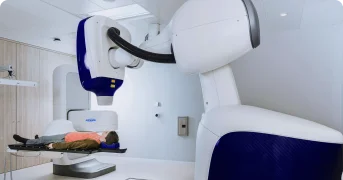
Medical
Imaging Device: FPGA aids in real-time image processing for medical imaging systems such as CT scans, MRIs, and ultrasound equipment.

Military and Aerospace
Radar System: FPGA is used for radar signal processing and target tracking to improve the accuracy and response speed of the system.
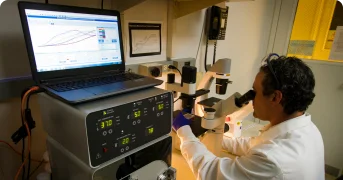
Scientific Research
Data Acquisition: FPGA helps with real-time processing and analysis of experimental data to boost experimental efficiency.
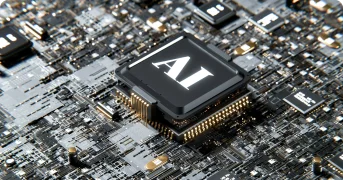
Artificial Intelligence
Machine Learning Inference: FPGA speeds up the inference process of machine learning models, improving inference speed and efficiency.
Communication

Communication

Base Station: FPGA is used in mobile communication base stations for digital signal processing tasks like modulation, demodulation, encoding, and decoding.
Automotive

Automotive

Advanced Driver Assistance System (ADAS): FPGA supports real-time image processing, sensor fusion, and decision-making algorithms for autonomous driving and safety features.
Industrial Control

Industrial Control

Automation System: FPGA is used for high-speed data collection, motion control, and process monitoring in industrial automation.
Consumer Electronics

Consumer Electronics

Video Processing: FPGA is used for high-definition video encoding, decoding and image processing to improve video playback and editing performance.
Medical

Medical

Imaging Device: FPGA aids in real-time image processing for medical imaging systems such as CT scans, MRIs, and ultrasound equipment.
Military and Aerospace

Military and Aerospace

Radar System: FPGA is used for radar signal processing and target tracking to improve the accuracy and response speed of the system.
Scientific Research Researchtion

Scientific Research

Data Acquisition: FPGA helps with real-time processing and analysis of experimental data to boost experimental efficiency.
Artificial Intelligence

Artificial Intelligence

Machine Learning Inference: FPGA speeds up the inference process of machine learning models, improving inference speed and efficiency.
Product Cases
Check out some of the typical FPGA design projects we have delivered

Medical Image Analysis System
Purpose
This system performs real-time analysis of medical images, such as CT or MRI scans, to help doctors diagnose diseases. FPGA is used to accelerate image processing and deep learning model inference, improving the speed and accuracy of image analysis.
Technologies Involved
- Image Processing Acceleration: FPGA speeds up image preprocessing, denoising, and feature extraction.
- Deep Learning Model Acceleration: It implement hardware acceleration of deep learning models such as Convolutional Neural Networks (CNNs) to enable fast image classification and lesion detection.
- Parallel Processing: It uses FPGA’s parallel computing power to handle large volumes of medical image data, enhancing system responsiveness.

High-Speed Data Acquisition System
Purpose
This system is used for real-time collection and processing of high-speed sensor data in research experiments. It needs to handle large data streams and perform complex data analysis to support precise experiments and real-time decision-making.
Technologies Involved
- High-Bandwidth Interface: It uses high-speed serial interfaces (like LVDS, SerDes) to support real-time transmission of large amounts of data.
- Data Flow Processing: It implements high-speed data processing algorithms and improve data throughput through pipeline structure and parallel processing.
- Real-Time Signal Processing: It uses FPGA’s hardware description language (HDL) for complex signal processing tasks like filtering and Fourier transforms, etc.
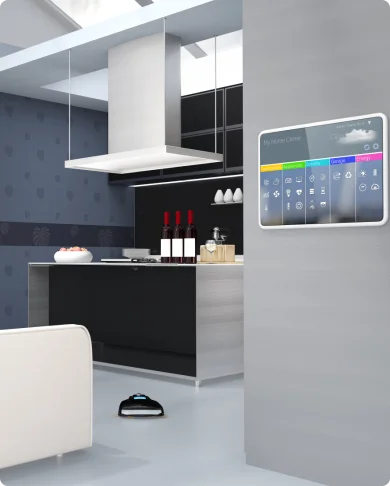
Smart Home Voice Control System
Purpose
This system controls home appliances through voice commands in a smart home environment. FPGA is used to speed up voice recognition and natural language processing, providing a smooth voice interaction experience.
Technologies Involved
- Voice Recognition Acceleration: It uses FPGA to speed up voice signal processing and keyword detection, reducing the delay from voice command to response.
- Natural Language Processing: It achieves rapid parsing and understanding of voice commands and optimizes natural language processing tasks through FPGA.
- Low-Latency Processing: FPGA’s high-speed parallel processing ensures immediate system response to user commands.
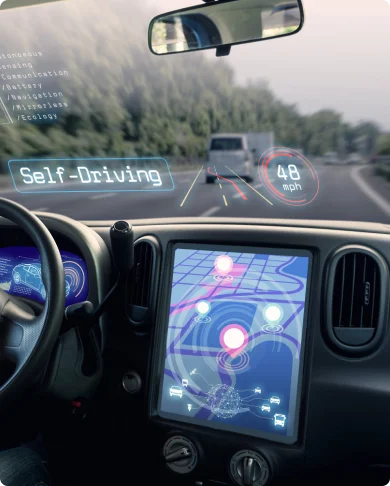
Autonomous Driving Decision System
Purpose
This system is used in self-driving cars to process data from cameras, radar, and lidar, and make real-time decisions to control the vehicle. FPGAs are used here to accelerate complex AI algorithms such as path planning and environmental perception.
Technologies Involved
- Real-Time Data Fusion: FPGA combines data from multiple sensors for real-time environment perception and decision-making.
- AI Accelerator: FPGA provides AI acceleration for self-driving applications, speeding up deep learning model inference.
- Parallel Computing: FPGA’s parallel processing boosts efficiency for complex computing tasks like object detection and trajectory prediction.
Why Choose Us

Functional Safety Support
We follow international safety standards like ISO 26262 for automotive electronics and IEC 61508 for industrial systems to ensure functional safety.
Functional Safety Support

Cost Reduction
We cut project costs by optimizing design and development processes. Early detailed analysis and planning help avoid later design changes and extra costs.
Cost Reduction
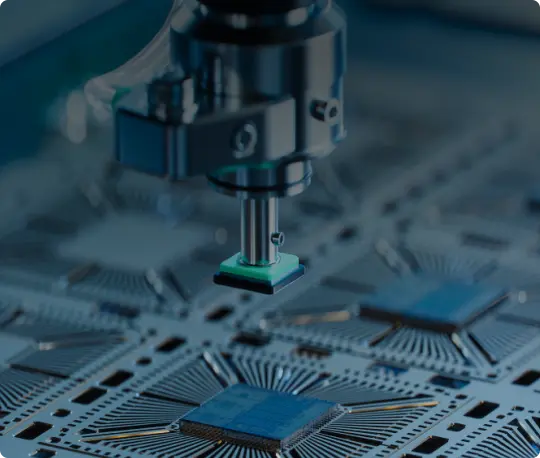
Diverse Project Scope
We offer a wide range of FPGA design services, from simple signal processing to complex AI acceleration solutions. Whether you need high-performance computing, real-time data processing, or embedded systems, we’ve got you covered.
Diverse Project Scope

Integrated Service
We provide a complete range of services from FPGA design and development to validation and production, including hardware design, logic development, system integration, and testing, to ensure that each project stage can be seamlessly connected and ultimately deliver high-quality products that meet customer needs.
Integrated Service

Flexibility
Our FPGA design services are highly flexible. We can quickly adapt to market changes and adjust product features or development timelines as needed.
Flexibility

Transparency
We promise to maintain high transparency throughout the project. We provide detailed progress reports, design documents, and test results, keeping you informed about every stage and progress of the project.
Transparency
Functional Safety Support
We follow international safety standards like ISO 26262 for automotive electronics and IEC 61508 for industrial systems to ensure functional safety.
Cost Reduction
We cut project costs by optimizing design and development processes. Early detailed analysis and planning help avoid later design changes and extra costs.
Diverse Project Scope
Integrated Service
We provide a complete range of services from FPGA design and development to validation and production, including hardware design, logic development, system integration, and testing, to ensure that each project stage can be seamlessly connected and ultimately deliver high-quality products that meet customer needs.
Flexibility
Our FPGA design services are highly flexible. We can quickly adapt to market changes and adjust product features or development timelines as needed.
Transparency
We promise to maintain high transparency throughout the project. We provide detailed progress reports, design documents, and test results, keeping you informed about every stage and progress of the project.
How we work with you

Requirement Analysis and Planning
We work closely with you to conduct a detailed requirements analysis to understand your project goals, functional requirements, and technical specifications. Through initial discussions and requirement gathering, we create a project plan and schedule, ensuring all key needs are addressed and setting clear goals for each project phase.
Design and Development

Once requirements are determined, our engineers start the design phase. We use advanced tools and technologies for HDL programming, logic design, and verification. During this process, we maintain regular communication with you to share design progress, technical solutions, and key decisions to ensure that the design solution meets your requirements.

Prototype Verification
After the design phase, we will make a prototype and perform detailed functional verification and
performance testing.
We will review the prototype with you, gather feedback, and make necessary
design
adjustments based on test results. This phase ensures the final product meets all functional and
performance standards.
System Integration and Testing

We integrate the FPGA design into the system and conduct comprehensive testing, including functionality,
performance, and reliability tests.
Throughout the process, we collaborate with you to ensure that the system integration goes
smoothly, all test results meet expectations, and any issues that arise are resolved.

Production and Delivery
Once design validation and system testing are completed, we move to production.
We offer
integrated production services, ensuring consistent quality in mass production. We will deliver the
product on time and provide necessary technical support to ensure your project progresses smoothly.
Continuous Improvement and Feedback

After the project is completed, we will collect your feedback and evaluate the project’s success and
areas for improvement.
We use this feedback for ongoing improvements, refining our design processes and
service quality to better meet your evolving needs and enhance overall project effectiveness and customer
satisfaction.


Requirement Analysis and Planning
We work closely with you to conduct a detailed requirements analysis to understand your project goals, functional requirements, and technical specifications. Through initial discussions and requirement gathering, we create a project plan and schedule, ensuring all key needs are addressed and setting clear goals for each project phase.

Design and Development
Once requirements are determined, our engineers start the design phase. We use advanced tools and technologies for HDL programming, logic design, and verification. During this process, we maintain regular communication with you to share design progress, technical solutions, and key decisions to ensure that the design solution meets your requirements.

Prototype Verification
After the design phase, we will make a prototype and perform detailed functional verification and performance testing. We will review the prototype with you, gather feedback, and make necessary design adjustments based on test results. This phase ensures the final product meets all functional and performance standards.

System Integration and Testing
We integrate the FPGA design into the system and conduct comprehensive testing, including functionality, performance, and reliability tests. Throughout the process, we collaborate with you to ensure that the system integration goes smoothly, all test results meet expectations, and any issues that arise are resolved.

Production and Delivery
Once design validation and system testing are completed, we move to production. We offer integrated production services, ensuring consistent quality in mass production. We will deliver the product on time and provide necessary technical support to ensure your project progresses smoothly.

Continuous Improvement and Feedback
After the project is completed, we will collect your feedback and evaluate the project’s success and areas for improvement. We use this feedback for ongoing improvements, refining our design processes and service quality to better meet your evolving needs and enhance overall project effectiveness and customer satisfaction.

Expertise In FPGA Design
Hardware Description Language (HDL)
●
VHDL: It is a hardware description language used to describe digital circuits and is suitable for logic modeling and verification in FPGA design.
●
Verilog: It is another commonly used hardware description language which is suitable for creating and simulating digital systems in FPGA design.
FPGA Architecture and Resources
●
Logic Units: It includes basic elements inside FPGA like lookup tables (LUTs), registers, and multipliers.
●
I/O Resources: It involves the input/output interface and peripheral connection of the FPGA.
●
Storage Resources: It includes the block RAM (BRAM) and distributed RAM inside the FPGA used in the design.
Digital Circuit Design
●
Combinational Logic: Design and optimize combinational logic circuits, such as adders, multipliers, and encoders.
●
Sequential Logic: Design and analyze sequential circuits, like flip-flops, counters, and state machines.
Timing Analysis and Optimization
●
Clock Management: Design clock distribution networks and handle clock domain crossing issues.
●
Timing Constraints: Set and optimize timing constraints (such as clock frequency, path delay) to ensure the performance of the design.
Design Optimization and Debugging
●
Performance Optimization: Improve the design to increase speed, reduce power consumption, and make better use of FPGA resources.
●
Debugging skills: Use logic analyzers, signal probes, and debugging tools like ChipScope to troubleshoot and verify the design.
Design Verification
●
Functional Verification: Perform functional tests to ensure that the design meets the specifications.
●
Verification Plan: Develop and execute verification plans, including unit testing, integration testing, and system testing.
Hardware and Software Co-Design
●
Hardware Acceleration: Moving compute-intensive tasks to the FPGA to speed up application performance.
●
Software Drivers: Writing and debugging software that interacts with FPGA hardware.
Learn More
Common FPGA design tools
01.
Xilinx Vivado Design Suite
02.
Intel Quartus Prime
03.
ModelSim
04.
Vivado Simulator
05.
Mentor Graphics Questa
06.
ChipScope Pro
07.
Intel SignalTap II
08.
Embedded Logic Analyzer (ILA)
09.
Vivado Layout
10.
Quartus Prime Fitter
06
ChipScope Pro
07
Intel SignalTap II
08
Embedded Logic Analyzer (ILA)
09
Vivado Layout
10
Quartus Prime Fitter
Chat with our experts for a detailed consultation on your FPGA development project


— EIPEKS CTO
If you’re working on a high-performance data processing or high-speed communication project, FPGA programming is an excellent choice. As the CTO of EIPEKS, I’ve seen firsthand how FPGA technology excels in various applications. We provide comprehensive FPGA development services, including hardware design, firmware development, and PCB and schematic design. Our team is composed of experienced experts who can efficiently meet the challenges of various complex projects and support you from concept to mass production.

— EIPEKS CTO
Our Technology Stack
Specialized Tools
• FPGA Development Boards (e.g., Xilinx, Intel/Altera boards)
• Hardware Debugging Tools (e.g., logic analyzers)
Software Platforms
• FPGA Design Suites (e.g., Xilinx Vivado, Intel Quartus Prime)
Tools and Languages
• Hardware Description Languages (HDL): Verilog, VHDL
• High-Level Synthesis Languages (HLS): C, C++
• Synthesis Tools: Xilinx Vivado Synthesis, Intel Quartus Synthesis
• Simulation Tools: ModelSim, Vivado Simulator
Hardware Design
• FPGA Logic Design
• Timing Analysis and Optimization
• Hardware Acceleration Design
Platforms
• FPGA Development Platforms (e.g., Zynq-7000, Cyclone V)
• Embedded System Platforms (e.g., Zynq UltraScale+ MPSoC)
Transceivers
• High-Speed Serial Transceivers (e.g., SerDes)
• Serial Interfaces (e.g., LVDS, USB, PCIe)
Network Protocols
• Ethernet Protocol
• PCIe Protocol
• DDR Protocol
• SPI, I2C
Networking
• Network Interface Cards (NIC)
• Network Protocol Stack Implementation
• Data Transfer and Processing Interfaces
FAQ
●
How long does an FPGA development project usually take?
The project duration depends on its complexity and requirements. Typically, FPGA development projects can take from a few weeks to several months, from initial planning to final delivery.
●
What FPGA platforms do you support?
We support major FPGA platforms like Xilinx, Intel (formerly Altera), and Lattice. We choose the best platform based on your specific needs and carry out corresponding development and optimization.
●
What is the difference between FPGA and traditional processors?
The main difference is flexibility and parallel processing capabilities. FPGAs can be reconfigured for specific tasks, while traditional processors have fixed architectures and processing capabilities.
●
How do you ensure the quality and reliability of FPGA design?
We ensure quality and reliability through a strict design process, thorough verification and testing, and continuous quality monitoring. We use advanced tools and techniques to minimize design flaws.
●
How to choose the right FPGA development tools?
Choosing the right FPGA development tool depends on the project requirements, target platform and development environment. We will recommend the most suitable development tool based on the customer’s specific needs and platform, and provide relevant technical support.
●
Do you support mass production of FPGA design?
Yes, we support the full range of FPGA production, from small-batch trial production to large-scale manufacturing.
●
Does your FPGA solution support embedded systems?
Yes, our FPGA solution can be integrated into embedded systems to provide high-performance processing capabilities and flexible functional expansion. We can customize the design according to the requirements.
Your Top FPGA Development Partner - EIPEKS
Contact us to discuss your next FPGA design project.

